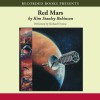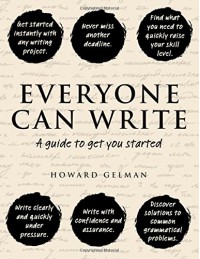
A short book with guidelines for writing non-fiction, including essays, reports and emails. The back of the book includes a list of common cliche's to avoid, and common grammar mistakes.
 2
2

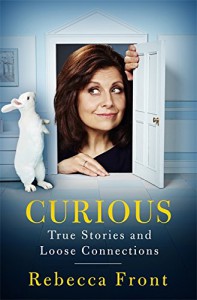
I know Rebecca Front from her work on the UK dark TV comedy Nighty night. I spotted this book of essays at the library and gave it a shot. I very rarely read biographies but I enjoyed this collection of anecdotes and observations on her life. I liked reading about the challenges of going on a holiday to a vegetarian inn in Scotland in the 1970s, how to she tries to cope with her phobias and anxieties, and I genuinely laughed out loud several times. Though her observations aren’t startling, they are very real, and I feel like I could get on very well with her if I ever got a chance to meet her. 3 stars.
 2
2
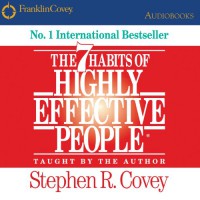
There's some solid advice here. Even if Covey was a Morman, and there is a bit in this book about "natural laws" as set up by God. I still think there's some useful tools in the 7 habits. I feel I got something good out of this book, especially about seeking first to understand.

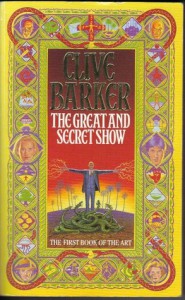
It took me a year to finish this book! Disturbing, long, but undeniably imaginative this is my least favourite of Barker's books I've read to date. I enjoyed aspects of this story, the plot is such that's impossible to summarize, I did try but it was getting so long I gave up. I'm still not sure what exactly happened, but it had it's moments and it's yet another of Barker's book's where the extra-ordinary is just under the surface of everyday life, but he's done it better.
 1
1
Yesterday's Kin by Nancy Kress
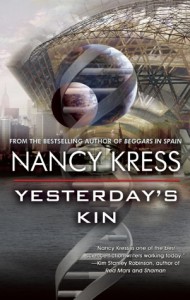
A decent, if short, story, Yesterday's kin begins when Marianne, an evolutionary geneticist, is taken by the FBI to the UN. She doesn't understand why. Even though she's just made a discovery about human evolution - she helped identify a new sub-group of humans who share a common ancestor who lived 150,000 years ago - she knows she's nothing special. She's just a work a day scientist who made a discovery rather than proving an brilliant theory or inventing an elegant equation. She's more worried about her children, who constantly fight with each other when they happen to see each other, or with her when she gets a chance to see them when she's not working. She's most concerned about Noah, her youngest who doesn't fit in anywhere, and is addicted to a new drug that permits you to feel like someone else for a short time.
It turns out the Aliens that arrived several months ago want to see Marianne, they are very interested in her genetics research and want her to continue it inside their alien Embassy floating in New York harbour.
The aliens are friendly, or so they claim, but no-one has seen them. They eventually do show themselves, and they look a lot like us. They come baring bad news, the earth will soon be moving through a gigantic spore cloud that will kill all humans, they know as some of their colonies have been wiped out from the same cloud. They request humanities best scientists to help them find a cure that can help both the aliens and humanity, but they've only got 10 months to do it. Can the world's top scientists achieve that? Why are the aliens so secretive, why don't they share their own research with the humans? With riots, shootings and terrorists, will humanity even survive long enough to be destroyed by the spore cloud?
Kress explores genetics, family politics, and human psychology all in an easy 200 pages.
Snow crash Neal Stephenson review
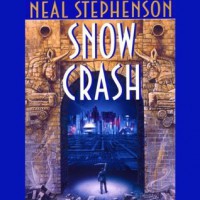
A classic of science fiction and cyber punk, this is the first Neal Stepenson I've read. It had some impressively prescient ideas for when it was published in the early 90s, but I'm not sure when this book was mean to be set. Someone reading this in 1995 would have found this even more fantastical than I did. The most interesting ideas were about virtual reality, the shrinking of the microchip and it's computing power exponentially increasing. I also liked dangerous concept of Library of Congress merging with intelligence arm of the government and turning into a warehouse of digital information. In New Zealand, our national library recently became a subsidiary of the Internal Affairs department, so this could happen to us eventually! The huge social and societal changes were less understandable, but maybe because I'm not an American this was harder to undersand. I didn't really understand any of the characters, and this seemed more like a bunch of cool ideas than one coherent novel. One of the least palatable aspects is the 15 year old character's explicit and detailed sex scene. I may eventually read some other Stephenson but if this was a good place to start I have my doubts
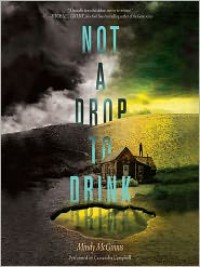
Water can no longer be taken for granted. Lynn, 16, lives with her Mother far away from the city. It's been years since the shortages drove them to hide away in a lonely farmhouse. She's trained Lynn to be completely ruthless killer, while quoting poetry and teaching her how to survive the unnamed apocalypse.
They guard their small pond of water against wanderers, and their nearest neighbor, Stebbs, who lives across the field. Mother refers to him as asshole, but the closest she gets to him is through the scope of her rifle.
Lynn begins slowly to make friends with neighbours, who had escaped recently from the city. She finds she has a conscience after all
When Lynn quotes William Butler Yeats, and her love interest, Eli, recognizes it, my suspension of disbelief evaporated like the water in this story. It also turns out Lynn is gorgeous, but since she'd never met anyone before, she's so modest. She doesn't understand small talk or flirting. But Eli's there to teach her, and teach her that she's so good looking. Luckily he's good looking too.
The book has several moments of shocking violence, that don't fit the tone of rest of the book, but make it less run of the mill, and overall more bearable. Lynn is a cold stone killer, but I'm glad she does have moments of happiness, or else this book would have been too bleak.
I listened to the audiobook and it was well read by Cassandra Campbell, who voiced several distinctive characters and could believe they were different people.
Book review: Steal across the sky by Nancy Kress

Nancy Kress sets up a fascinating premise in this novel. Aliens, who refer to themselves as Atoners, set up a website and email address for humans to apply to become "Witnesses" to a mysterious crime the Aliens committed against humanity 10,000 years ago. Millions apply, but only 21 are selected, 15 coming from the United States. This seems to be a theme in Nancy Kress's books, briefly mentioning other areas of the world (a greater acknowledgement than some other US writers) but ultimately focusing on the importance of the United States influence on events, sometimes even on an interstellar scale.
It transpires that the Atoners kidnapped our ancestors and took them to various star systems. Each system has one A planet and one B planet, the earth serving as the control in an epic experiment. The witnesses find primitive cultures on each of the planets and it takes the first half of the novel to discover what it is the Atoners did in their experiments and what they are trying to fix.
The second half of the novel is the fall out of the revelation on Earth and how we cope, or fail to cope, with it.
Throughout the story we switch between key witnesses’ perspectives. After their initial thrill about being chosen as witnesses, most have to contend with their frustration over not knowing what they are meant to be witnessing, then eventually once they discover what the Atoners have done, what the Atoners want the witnesses to do or say about it. The Atoners never set foot on earth or any of the other experimental planets, and remain largely mysterious throughout. I did have some sympathy for Soledad, a witness who has to deal with a lot of crap, but I didn't feel much for the other characters. While I did enjoy the book, and Kress is a solid writer, this story could have been much shorter and had the same level of impact.
I listened the audiobook and Kate reading did a good job distinguishing between male and female voices, and overall it was professional if not standout, performance.
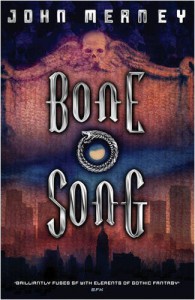
John Meaney has rich and vivid imagination. He's created an alternative universe where cities are powered by the bones of the dead. Wraiths exist inside cars, motorcycles, even lamps, and seem to be a de-facto for artificial intelligence. I was often caught out by a description that was strange not only to me, but was impressive or different for the main character. I never felt I had an understanding of the rules of this world, I know show don't tell, but there wasn't enough showing. Things were strange, people died, and sometimes they came back. There was also a police procedural and hunt for a cadre of killers, but that was the least interesting aspect of this book.
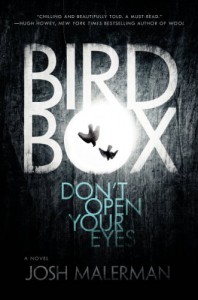
In New Zealand slang, "box of birds" means you are feeling well and happy. It's an expression to answer the question "How are you?". After reading this book, that expression is a bit ruined for me now!
The main character, Malorie, finds herself pregnant just as the world comes to an end. The end starts with mysterious acts of brutality and suicide becoming more and more common over the world. The one thing that links them is that people see something that turns them violently insane. The book covers two time periods, when Melorie enters a safe house set up for survivors, and 4 years later with two children "boy" and "girl", that she is caring for by herself. The premise is terrifying, and had me thinking of The Happening, The Others & the Dr Who episode Blink. Some aspects stretched my suspension of disbelief to breaking point, power is on, with the blasé explanation it's hydro so it works all the time, & telephones still work. Without power, it'd have made the world a lot harder to live in as they could never look outside, and inside had to be completely cut off with blankets on the windows (hello, did they not have curtains? Would blankets be much better then secure curtains?)
Well written and full of suspense, Box of birds is worth it if you overlook a few flaws.
Ancient Awakening
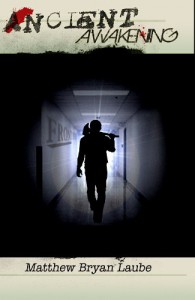 An easy horror read with a new take on the vampire and werewolf origin story. While demons slowly possess people in a hospital, our PhD student heroine Ann is trying to track down her on-again off-again Dr boyfriend with no luck, while there she meets off-duty traffic cop Matt. Also arriving at the same time is Joseph Miller, a supernaturally powered man, with a very cheery personality, who is reborn each time demons start getting out of hand on earth. Together they try to figure what the hell is going on at the hospital. A good sprinkling of humour and quick action kept me entertained right to the end.
An easy horror read with a new take on the vampire and werewolf origin story. While demons slowly possess people in a hospital, our PhD student heroine Ann is trying to track down her on-again off-again Dr boyfriend with no luck, while there she meets off-duty traffic cop Matt. Also arriving at the same time is Joseph Miller, a supernaturally powered man, with a very cheery personality, who is reborn each time demons start getting out of hand on earth. Together they try to figure what the hell is going on at the hospital. A good sprinkling of humour and quick action kept me entertained right to the end.
The Atlantis Gene
 This book has a lot of 5 star reviews on Amazon. For a debut self-published novel I congratulate the author on his success it must feel great and lead to a lot more sales. I bought the book, only a dollar or two, and for that price and the author's experience it's a decent read. A science thriller, with many elements, probably too many, going on. The plot called for us to believe in 9/11 conspiracy theories, secret societies, espionage, kidnapping, breakthrough genetic therapies for autism, and well before the end of the book credibility was stretched to breaking. I can see why other reviewers disliked it. But also see the potential and acknowledge there's a a good writer in there, trying to tell a convoluted story. The spelling and editing was good, and for many self published ebooks is is not always the case. However there were too many short chapters, over 100, and even though I think the author did tis to ensure a sense of fast-paced tension, it still dragged and there was not enough descriptive detail about where the events where taking place, especially towards the end of the book. The characters were sketches, we didn't really get enough time to get to know them, and they seemed like they were being pulled along by e plot rather then driving it themselves. I do want to see what happens next and learn more about the genetics and evolution of humans that gets discussed, so I will get the sequel.
This book has a lot of 5 star reviews on Amazon. For a debut self-published novel I congratulate the author on his success it must feel great and lead to a lot more sales. I bought the book, only a dollar or two, and for that price and the author's experience it's a decent read. A science thriller, with many elements, probably too many, going on. The plot called for us to believe in 9/11 conspiracy theories, secret societies, espionage, kidnapping, breakthrough genetic therapies for autism, and well before the end of the book credibility was stretched to breaking. I can see why other reviewers disliked it. But also see the potential and acknowledge there's a a good writer in there, trying to tell a convoluted story. The spelling and editing was good, and for many self published ebooks is is not always the case. However there were too many short chapters, over 100, and even though I think the author did tis to ensure a sense of fast-paced tension, it still dragged and there was not enough descriptive detail about where the events where taking place, especially towards the end of the book. The characters were sketches, we didn't really get enough time to get to know them, and they seemed like they were being pulled along by e plot rather then driving it themselves. I do want to see what happens next and learn more about the genetics and evolution of humans that gets discussed, so I will get the sequel.
Dear Photograph
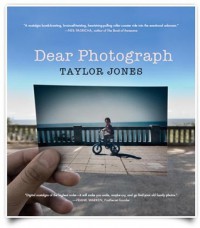 I had visited the dear photograph website, where people retake old photos in the same location as the original photo while addressing the photo ("Dear Photograph..") reminiscing about the time when the photo was taken. I then saw this book on display at the local library and picked it up. This book gathers together some good examples from the website, and they are often touching or poignant. It's interesting how much stays the same for the people's lives who contribute to the website and the book. Does it say anything about how stable they are that they can retake a photograph decades after they originally took it? That they live in the same city, neighborhood or even house? We don't get much of a sense of the people taking the photo, as they often only write a sentence or two addressing the photo. I'd have liked to have more context for a lot of these pictures.
I had visited the dear photograph website, where people retake old photos in the same location as the original photo while addressing the photo ("Dear Photograph..") reminiscing about the time when the photo was taken. I then saw this book on display at the local library and picked it up. This book gathers together some good examples from the website, and they are often touching or poignant. It's interesting how much stays the same for the people's lives who contribute to the website and the book. Does it say anything about how stable they are that they can retake a photograph decades after they originally took it? That they live in the same city, neighborhood or even house? We don't get much of a sense of the people taking the photo, as they often only write a sentence or two addressing the photo. I'd have liked to have more context for a lot of these pictures. It's still an interesting book, with some nice photos.
Century Rain
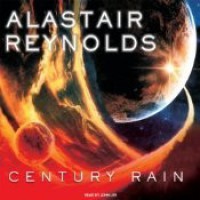 I loved this story, and was sad to find it was a standalone as upon finishing I immediately looked for the sequel. However, it is a complete story in itself. The book starts off as sci-fi thriller set 200 years in the future, where an Apocalypse has rendered earth a lifeless husk, and we are following the story of an archaeologist studying the wastelands of Paris. The story then switches to Paris of the 1950s, but not a 1950s we recognize, some things that should have happened by 1959, haven't.
I loved this story, and was sad to find it was a standalone as upon finishing I immediately looked for the sequel. However, it is a complete story in itself. The book starts off as sci-fi thriller set 200 years in the future, where an Apocalypse has rendered earth a lifeless husk, and we are following the story of an archaeologist studying the wastelands of Paris. The story then switches to Paris of the 1950s, but not a 1950s we recognize, some things that should have happened by 1959, haven't. The stories intertwine, and we are treated to a thriller where the main protagonist, aforementioned archaeologist, Verity Auger, has to complete a mission on this 1950s world as she has the knowledge of Paris at this time. She is a kick-ass character and Reynolds treats her to several near death experiences which left me on a rollercoaster ride of emotion, wondering if she, and the other characters I had come to care about with little, but careful, character development, were going to make it. Recommended.
Audio-book version:
I listened to the audio-book narrated by the British John Lee. He did an excellent job with the many female voices, and his narration was very even and I now associate Alastair Reynolds with John Lee's narration.
Be the Change: Saving the World with Citizen Science
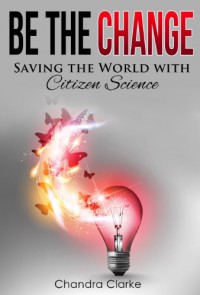 I received a copy through librarything's member give-away programme.
I received a copy through librarything's member give-away programme. I enjoyed this short book introducing me to the concept of citizen science. Being a sci-fi geek, of course I'd heard of SETI, the project crowdsourcing computing power from around the world in the search for radio signals from extraterrestrial civilizations. I didn't know about the many other projects that are discussed in the book, some that require very little effort to be involved in. I will be investigating these and Chandra Clarke's site.
Just Ride: A Radically Practical Guide to Riding Your Bike
 I don't understand who this book is for. The book is less a guide to cycling as a ranting manifesto on why the cycle racing industry and sport has harmed cycling. Especially cycling as a daily activity with few hurdles besides a reliable bike. I've seen many internet comment wars between the so-called Lycra brigade and everyone else, but I'm not on either side. I prefer live and let live, and I wish both sides took that approach too. I didn't learn a whole lot from this book, a few points about wooden bikes (hadn't heard this was a thing) and learning to turn with the body rather then the handlebars - which I understand the theory but not the application. Petersen describes himself and the people who he likes as unracers, people who ride for enjoyment rather then putting in long group rides in lycra trying to train for a big race. For a book that bemoans racers, I read far too much about racing and group rides; how training doesn't make you fit; how bikes (and tyres) are over designed and too expensive and don't work in real world conditions yet I wanted a guide for the average bicycle rider, a long way from the world of competitive road cycling. If I was a member of the lycra brigrade I would find this book even more divisive and off-putting.
I don't understand who this book is for. The book is less a guide to cycling as a ranting manifesto on why the cycle racing industry and sport has harmed cycling. Especially cycling as a daily activity with few hurdles besides a reliable bike. I've seen many internet comment wars between the so-called Lycra brigade and everyone else, but I'm not on either side. I prefer live and let live, and I wish both sides took that approach too. I didn't learn a whole lot from this book, a few points about wooden bikes (hadn't heard this was a thing) and learning to turn with the body rather then the handlebars - which I understand the theory but not the application. Petersen describes himself and the people who he likes as unracers, people who ride for enjoyment rather then putting in long group rides in lycra trying to train for a big race. For a book that bemoans racers, I read far too much about racing and group rides; how training doesn't make you fit; how bikes (and tyres) are over designed and too expensive and don't work in real world conditions yet I wanted a guide for the average bicycle rider, a long way from the world of competitive road cycling. If I was a member of the lycra brigrade I would find this book even more divisive and off-putting.
